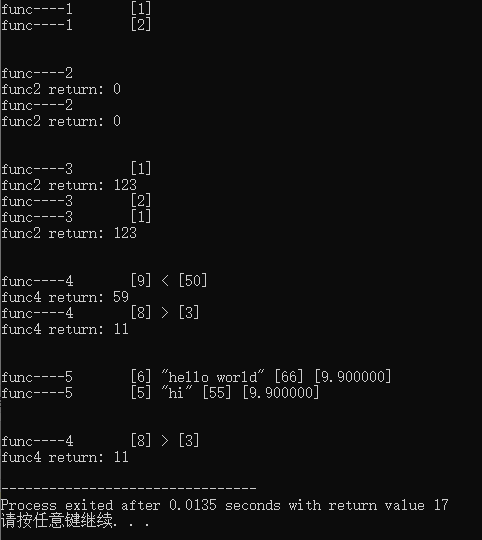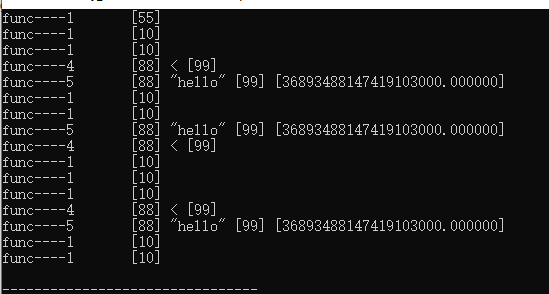示例一:
1 #include<stdio.h> 2 #include<stdlib.h> 3 4 typedef void *(*func_t)(void*, ...) ; 5 func_t func; 6 7 typedef struct set { 8 func_t func; 9 void * arg; 10 } set_t; 11 12 13 14 void func1(int a) 15 { 16 printf("func----1 [%d] ", a); 17 } 18 19 int func2(void) 20 { 21 printf("func----2 "); 22 23 return 0; 24 } 25 26 27 char* func3(int a) 28 { 29 while (a > 0) 30 printf("func----3 [%d] ", a--); 31 32 return "123"; 33 } 34 35 36 int func4(int a, int b) 37 { 38 39 printf("func----4 [%d] %s [%d] ", a, ((a == b) ? "==" : ((a > b) ? ">" : "<")), b); 40 41 return (a + b); 42 } 43 44 void func5(int a, char* str, int b, float c) 45 { 46 c = 9.9; 47 printf("func----5 [%d] "%s" [%d] [%f] ", a, str, b, c); 48 49 } 50 51 void main() 52 { 53 set_t set_1; 54 int a = 3, b = 7; 55 int *intp; 56 57 func = (void*)func1; 58 set_1.func = (void*)func1; 59 60 (func)((void*)1); 61 (set_1.func)((void*)2); 62 printf(" "); 63 64 65 func = (void*)func2; 66 set_1.func = (void*)func2; 67 68 printf("func2 return: %d ", (func)((void*)1)); 69 printf("func2 return: %d ", (set_1.func)((void*)2)); 70 printf(" "); 71 72 73 func = (void*)func3; 74 set_1.func = (void*)func3; 75 76 printf("func2 return: %s ", (func)((void*)1)); 77 printf("func2 return: %s ", (set_1.func)((void*)2)); 78 79 80 func = (void*)func4; 81 set_1.func = (void*)func4; 82 printf(" "); 83 84 printf("func4 return: %d ", (func)((void*)9, (void*)50)); 85 86 printf("func4 return: %d ", (set_1.func)((void *)8, 3)); 87 printf(" "); 88 89 90 func = (void*)func5; 91 set_1.func = (void*)func5; 92 93 (func)((void*)6, "hello world" ,66, (void*)6); 94 (set_1.func)((void*)5, "hi", 55, (void*)5); 95 printf(" "); 96 97 intp= (int*)func4; 98 printf("func4 return: %d ", ((func_t)intp)((void *)8, 3)); 99 }
运行结果:

示例二:

1 #include<stdio.h> 2 #include<stdlib.h> 3 #include <time.h> 4 5 typedef void *(*func_t)(void*, ...) ; 6 func_t function; 7 8 typedef struct set { 9 func_t func; 10 int start_time; 11 int wait_time; 12 } set_t; 13 14 int ex_time(int start, int timer) 15 { 16 if ((clock() - start) > timer) 17 return 1; 18 else 19 return 0; 20 } 21 22 23 #define CONNE(x,y) (x##y) 24 #define SET_INIT(name) set_t name##set = { 25 .func = (void*)name, 26 .start_time = 0, 27 .wait_time = 0 28 }; 29 30 31 #define SET_FUNC(name, t, ...) 32 { 33 if (ex_time(name##set.start_time, t)) { 34 name##set.start_time = clock(); 35 name##set.func((void*)__VA_ARGS__); 36 } 37 } 38 39 void func1(int a) 40 { 41 printf("func----1 [%d] ", a); 42 } 43 44 int func2(void) 45 { 46 printf("func----2 "); 47 48 return 0; 49 } 50 51 52 char* func3(int a) 53 { 54 while (a > 0) 55 printf("func----3 [%d] ", a--); 56 57 return "123"; 58 } 59 60 61 int func4(int a, int b) 62 { 63 64 printf("func----4 [%d] %s [%d] ", a, ((a == b) ? "==" : ((a > b) ? ">" : "<")), b); 65 66 return (a + b); 67 } 68 69 void func5(int a, char* str, int b, float c) 70 { 71 printf("func----5 [%d] "%s" [%d] [%f] ", a, str, b, c); 72 } 73 74 SET_INIT(func1); 75 SET_INIT(func4); 76 SET_INIT(func5); 77 78 void main() 79 { 80 int func_addr = (int)func1; 81 float value = 6.6; 82 83 /*强制转换为函数指针类型*/ 84 ((void (*)(int))func_addr)(55); 85 86 int start_time = clock(); 87 while (!ex_time(start_time, 2000)) { 88 SET_FUNC(func1, 200, 10); 89 SET_FUNC(func4, 500, 88, 99); 90 SET_FUNC(func5, 500, 88, "hello", 99, value); 91 } 92 }
运行结果:

